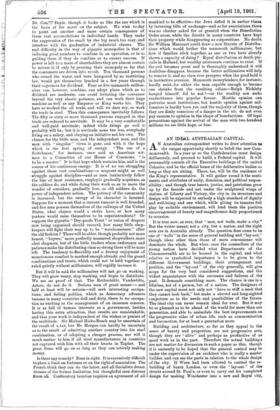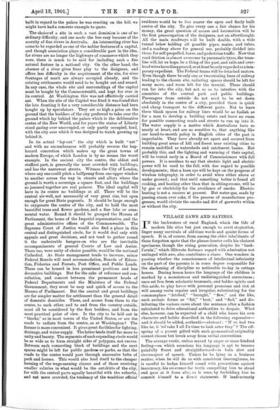AN IDEAL .A.ITSTRALIA.N CAPITAL.
AN Australian correspondent writes to draw attention to the unique opportunity shortly to befall the new Com- monwealth. In a year or so the Confederation must design deliberately, and proceed to build, a Federal capital. It will presumably contain all the Executive buildings of the united Colonies, and be the official home of the deliberative bodies so long as they are sitting. There, too, will be the residence of the King's representative. It will gather round it the senti- ments and attributes of unity, dominion, and political respon- sibility; and though true hearts, justice, and patriotism grow up by the fireside and not under the sculptured wings of statues of Liberty and Victory, the city in its structure and design will be expected to embody a high standard of dignity and well-being, and one which, while giving its inmates full play by suitable environment, will lend them the positive encouragement of beauty and magnificence duly proportioned to occasion.
It is true now, as ever, that "men, not walls, make a city." But the writer meant, not a city, but a nation, and the right men are in Australia already. The question does come to be one of "walls" in the sense of general building and "lay-out," though ideas other than those of mere convenience will dominate the whole. But when once the counsellors of the young nation have decided what Departments of the Commonwealth are to be housed in the capital, and what relative or symbolical importance is to be given to the different Government buildings, their arrangement and positien, and the " lay-out " of the city generally, will give scope for the very best considered suggestions, and the widest acquaintance with the successes and failures of the past. It demands something more. The chance is one in a lifetime, not of a person, but of a nation. The designers of the new capital must not only not "have so stiff a neck that they cannot look back," but make a shrewd and long-sighted conjecture as to the needs and possibilities of the future. The ideal city can never remain ideal for ever. But it may be so planned as to be ahead of the world for more than one generation, and able to assimilate the best improvements on the progressive sides of urban life, such as communication and locomotion, for at least a generation more.
Building and architecture, so far as they appeal to the sense a beauty and proportion, are not progressive arts, though they are "alive" and perhaps as productive of as good work as in the past. Therefore the actual buildings are not matter for discussion in such a paper as this, though it is earnestly to be hoped that the general control may be under the supervision of an architect who is really a master builder, and can see the parts in relation to the whole design of the city. If Wren had been allowed to control the re- building of burnt London, or even the " lay-ont " of the streets around St. Paul'*, or even to carry out his completed design for making Winchester into a new and Royal city, built in regard to the palace he was erecting on the hill, we might have had a concrete example to miote.
. The choice of a site in such a vast dominion is one of no orainaty, difficulty, and one made the less easy because of the scarcity of fine rivers in Australia. An intersecting river has come to be regarded as one of the nobler features bf a capital, and though association plays a considerable part in the idea, for rivers are no longer the highways of commerce which they were, there is much to be said for including such a fine natural feature in a national city. On the other hand, the absence of a river gives freer play to the designers, and Offers less difficulty in the acquirement of the site, for river frontages of merit are always occupied already, and the existing settlements would need to be bought out and erased. In any case, the whole site and surroundings of the capital must be bought by the Commonwealth, and kept for ever in it control. At Washington this was not effectively carried out. When the site of the Capitol was fixed it was found that the lots fronting it for a very considerable distance had been 'bought up by speculators. They set so high a price on the ground that the builders of the city preferred to take over the ground which lay behind the palace which is the deliberative centre of the New World, and for years the statue of Liberty stood gazing over unoccupied, or only partly occupied, land, with the city over which it was designed to watch growing up behind it.
In its actual "lay-out" the city which is built " net " and with no encumbrances will probably reverse the hap- hazard concretion which makes up the great towns of modern Europe, of which London is by no means the worst example. In the ancient city the centre, the oldest and stuffiest part, is generally the most crowded with buildings, and, has the narrowest streets. Witness the City of London, where any one could pitch a halfpenny from one upper window to another across the way in streets and alleys where the ground is worth a sovereign a square foot; and the buildings so jammed together are real palaces. The ideal capital will have in. its centre no buildings at all. There will be the central air-well, not necessarily of very great size, but open enough for great State pageants. It should be large enough to oxYgenate the centre of the city, and to hold the most beautiful trees and flower gardens, and a fine lake or orna- mental water. Round it should be grouped the Rouses of Parliament, the home of the Imperial representative, and the great administrative offices of the Commonwealth. The Supreme Court of Justice would also find a- Place in this central and distinguished circle, for it would deal only with appeals and great decisions, and not tend to gather round it the undesirable hangers-on who are the inevitable accompaniments of general courts of Law and Assize. There too, were unity of choice possible, would be the national Cathedral. ' As State management tends to increase, minor Federal Boards will need accommodation, Boards of Educa- tion, Fisheries and Forests, Post Office, and Public Lands. These can be housed in less prominent positions and less decorative buildings. But for the sake of reference and con- aultation, and concert between the permanent heads of Federal Departments and the 14inisters of the Federal Gkivernment, they must be easy and quick of access to the Rouses of Parliament. But the central and great buildings are far simpler matter for settlement than the general detail of domestic domiciles. These, and access from them to the centre, to each other, and to and from the country outside, must all be considered by the first builders, and from the most practical point of view. Is the city to be laid out in "blocks," as in most towns of the -United States, or are the roads to radiate from the centre, as at Washington? The former is more convenient. It gives great facilities for lighting, drainage, and water supply. The latter lends itself far more to unity and beauty. The segments of each expanding circle would be so wide as to form straight sides of polygons, not curves. Between each connecting block of buildings and the next spaCes might be left for public gardens or parks, so that the roads to the centre would pass through successive belts of 'park and houses. This would also lend itself to the cheaper housing of the wage-earning classes and of those receiving smaller salaries in what woUld be the outskirts of the city, for with the central parts equally beautiful with the suburbs, and not more crowded, the tendency of- the wealthier official residents would be to live nearer the open and finely built centre of the city. To give every one a fair chance for his money, the great qnestion of access and locomotion will be the first preoccupation of the designers, not an afterthought. All the main roadways yin be built double, with a wide tunnel below holding all possible pipes, mains, and tubes, and a roadway above for general use, probably divided into three, for self-propelled, horse, and pedestrian traffic. Now that road friction is almost overcome by pneumatic tyres, the tram- line will, let us hope, be a thing of the past, and rails and over- head wires have disappeared, or at least be only regarded as a tem- porary expedient. The Federal trams will be detached motors.
Even though there be only One or two existing lines of railway ' . leadmg to the chosen site, radiating spaces should be left for many more, and room left for the termini. These should run far into the city, but not so as to interfere with the amenities of the central park and public building. Passengers from outside do not need to be set down absolutely in the centre of a city, provided there is quick and cheap transport to the different parts. Not to leave these blank spaces for railway lines would be as foolish as for a man to develop a building estate and leave no room for possible connecting roads and streets to run up into it. The water supply is a matter which Australians have so nearly at heart, and are so sensitive to, that anything like our hand-to-mouth policy in English cities of the past is improbable. They have already set apart and secured from building great areas of hill and forest near existing cities to remain undefiled as watersheds and catchment basins. But probably this, and the lighting and warming of their capital, will be vested early in a Board of Commissioners with full powers. It is needless to say that electric light and electric power will be used to the full, with due regard to possible developments; that a keen eye will be kept on the progreas of wireless telegraphy, in order to avoid wires either above or under ground; and that until something, better is found all cooking, and heating other than that in sitting-rooms, will be by gas or electricity for the avoidance of smoke. Electric heating is not a success at present. But water-gas, made by passing steam over coke, if the process of manufacture pro- gresses, would obviate the smoke and dirt of gasworks within or without the city.







































 Previous page
Previous page